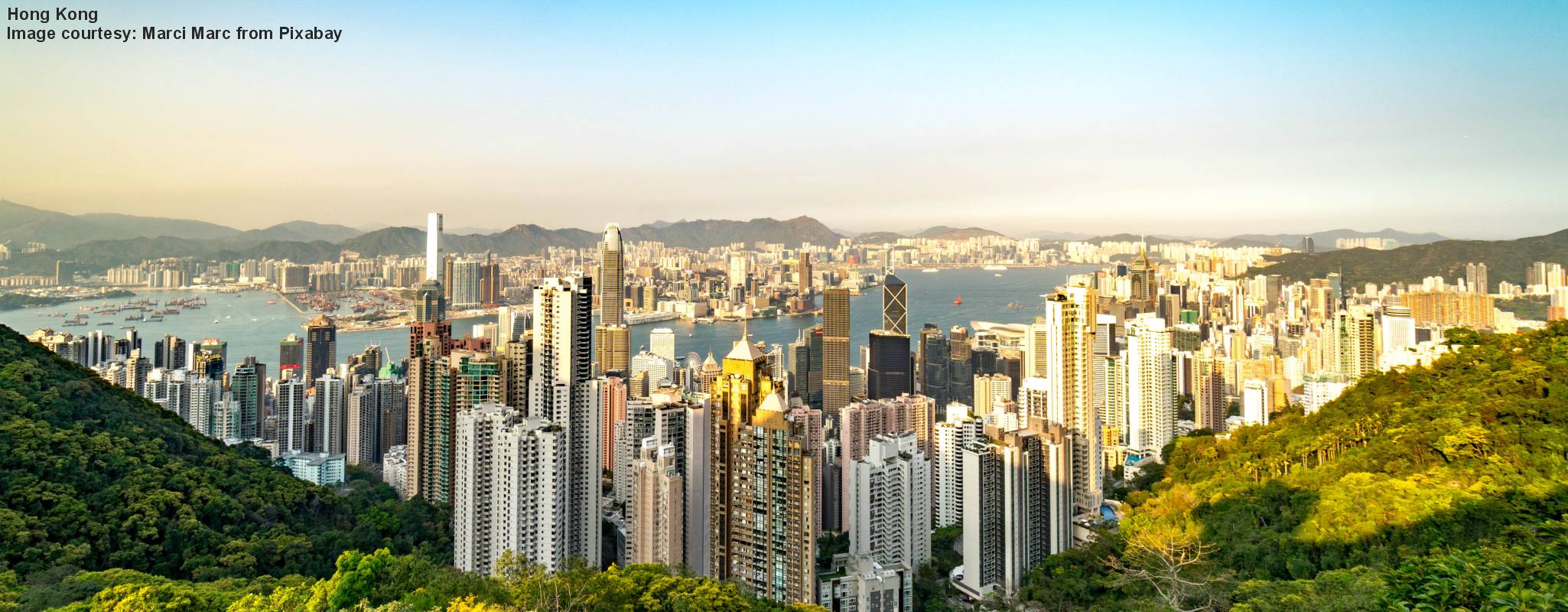


Hong Kong's location, climate & geography
Hong Kong is a vibrant metropolis located on the southeastern coast of China, bordering the South China Sea. It comprises a peninsula and several islands, with its most well-known areas being Hong Kong Island, Kowloon Peninsula, and the New Territories. Its strategic location as a gateway to Asia has made it a vital economic and cultural hub.
The city's subtropical climate is characterized by distinct seasons. Summers (June to August) are hot and humid, with temperatures often exceeding 30°C (86°F) and occasional typhoons. Winters (December to February) are mild and dry, with temperatures averaging around 17°C (63°F). Spring and autumn are pleasant, with more moderate temperatures and lower humidity.
Hong Kong's geography is a striking blend of towering skyscrapers, lush green hills, and serene waterways. The Victoria Harbour divides the city into Hong Kong Island and Kowloon Peninsula, connected by numerous bridges and tunnels. The city's steep terrain has led to the development of iconic outdoor escalators and Mid-levels, a residential area perched on the slopes.
Its proximity to the South China Sea means that Hong Kong's climate is greatly influenced by ocean currents. While its urban areas are characterized by modernity and commerce, the surrounding natural landscapes provide opportunities for outdoor adventures, such as hiking in lush country parks and exploring tranquil fishing villages. This unique blend of urban sophistication and natural beauty makes Hong Kong a truly remarkable destination.
Getting to and around Hong Kong
Getting to and around Hong Kong is remarkably convenient and efficient due to its well-developed transportation network. The city is served by Hong Kong International Airport, one of the world's busiest and most modern airports, providing both domestic and international flights. From the airport, you can easily reach the city center via the Airport Express train, buses, or taxis.
Within the city, the Mass Transit Railway (MTR) system is the backbone of public transportation. It covers Hong Kong Island, Kowloon, and parts of the New Territories, offering a fast, reliable, and extensive way to get around. The iconic Star Ferry also connects Hong Kong Island and Kowloon, providing a scenic route across Victoria Harbour.
Buses, minibuses, and trams provide additional options for traversing the city, while taxis are readily available and relatively affordable. The Octopus Card, a contactless payment card, can be used on various modes of transport and makes getting around even more convenient.
Exploring the outlying islands is a must-do experience. Ferries and boats connect the main islands, including Lantau Island (home to attractions like Disneyland and Ngong Ping 360), Lamma Island, and Cheung Chau.
Walking is also an enjoyable way to explore the city, particularly in areas like Central and Causeway Bay. Many districts are pedestrian-friendly, and you can discover hidden gems by wandering through bustling markets, historic neighborhoods, and charming alleys.
In summary, Hong Kong offers a seamless experience for getting to and around the city, whether you're flying in, hopping on the MTR, riding a ferry, or taking a leisurely stroll through its dynamic streets and neighborhoods.
10 things to know when travelling to Hong Kong
1. Visa Requirements: Many nationalities can enter Hong Kong without a visa for a short stay. Ensure you understand the visa requirements based on your nationality and travel purpose.
2. Weather Considerations: Hong Kong has a subtropical climate with distinct seasons. Check the weather forecast before your trip and pack accordingly.
3. Language: While Cantonese is the primary language, English is widely spoken, especially in tourist areas.
4. Currency: The official currency is the Hong Kong Dollar (HKD). Credit cards are widely accepted, but it's a good idea to have some cash on hand for smaller establishments.
5. Safety: Hong Kong is generally safe, with low crime rates. Exercise caution as you would in any major city and keep an eye on your belongings.
6. Tipping: Tipping is not obligatory but appreciated. Some restaurants and hotels include a service charge, while others may not.
7. Cultural Etiquette: Hong Kong residents are respectful of traditional customs. It's polite to accept business cards with both hands, and avoid pointing your feet at people or religious symbols.
8. Local Customs: When visiting temples or entering people's homes, remove your shoes. It's customary to leave a bit of food on your plate to indicate you are full, rather than cleaning your plate entirely.
9. Electrical Outlets: Hong Kong uses a standard electrical voltage of 220V with a frequency of 50Hz. The power plugs are of type G, which has three rectangular pins.
10.Internet Access: Hong Kong offers widespread free Wi-Fi in many public places, hotels, and restaurants. You can also purchase SIM cards at the airport or shops for convenient mobile data access.
Last update August 2023


